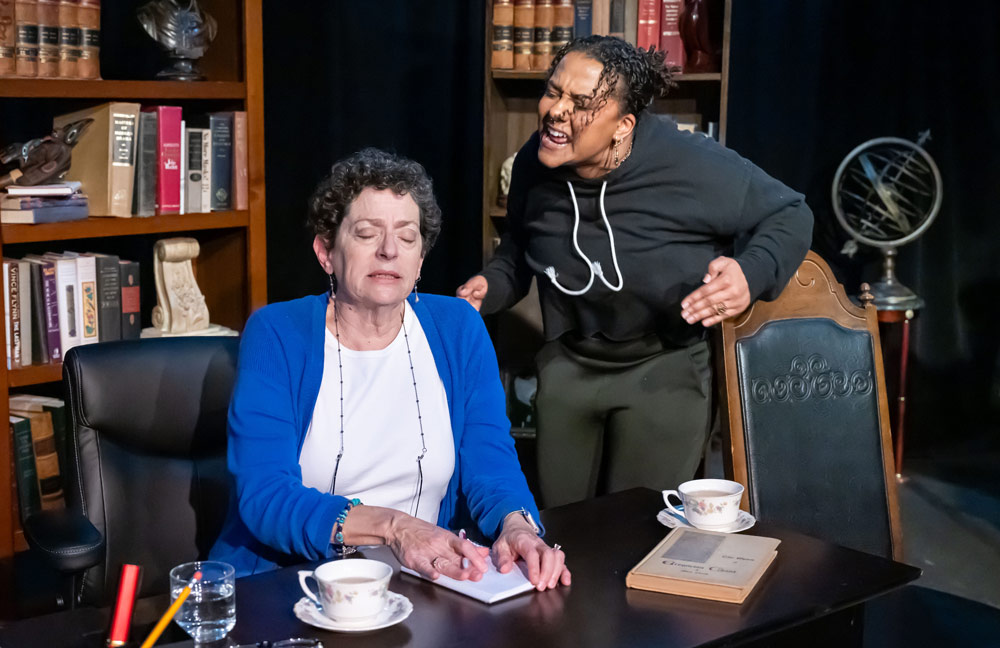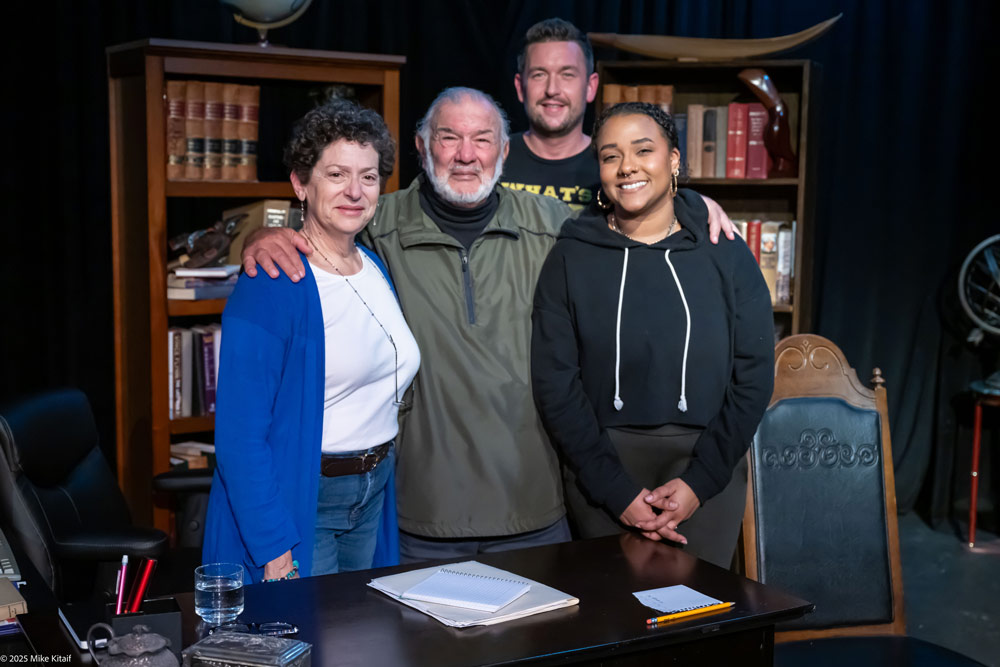
See Also: “Who Do You Think You Are? Here’s Why You Should See ‘The Niceties’ at CRT”
In “The Niceties,” Eleanor Burgess’ 2018 two-person play, Zoe – a Black millennial Ivy League student – heatedly confronts her white, female Boomer history professor: “Listen, there is one appropriate way to respond to a woman of color when she says ‘I have an idea to assert,’ and that is to shut up and listen because she has experiences that you cannot possibly know and insights you can learn from.”
Burgess set her drama, which runs Thursday, Feb. 20 through Sunday, Feb. 23 at City Repertory Theatre in Palm Coast, during the 2016 Trump/Hillary Clinton presidential campaign, when the shine of Barack Obama’s almost-over, two-term run as America’s first Black president was still evoking widespread punditry – even dreams – about the U.S. becoming a “post-racial” society.
However, even before Donald Trump returned to the White House this year on Jan. 20 (Martin Luther King Jr. Day) and promptly began using his executive-order pen to bludgeon post-racial dreams and diversity, equity and inclusion initiatives into oblivion, the fictional Zoe would have found it difficult to press her thesis about slavery’s effect on the American Revolution.
In an August 4, 2023, Newsweek commentary headlined “Florida Can’t Decide If It Wants to Erase Black History, or Just Lie About It,” Ohio Democratic Congresswoman Shontel Brown wrote that Florida’s new 2023 standards for social studies education “banned an advanced placement course on African American studies and the state implemented new laws – championed by Governor DeSantis – that have led to more than 300 books being banned by local school districts. That includes literature related to Black history, from the novels of Toni Morrison to nonfiction books about Black life, culture, and the impact of racism.”
Florida’s restrictions, Brown wrote, are “part of an ongoing, and far from new, effort across the country to erase, distort, and deceive people about Black history and American history overall.”
A Dec. 23, 2024 Associated Press story was headlined: “Florida students are giving up Saturdays to learn Black history lessons their schools don’t teach.”
And now Trump’s executive orders during the first few weeks of his second term have spawned such headlines as “Trump Signs Two Orders to Dismantle Equity Policies,” “Education Dept. Gives Schools Two Weeks to Eliminate Race-Based Programs,” “Some Schools Act After Trump’s D.E.I. Orders. Others Say They’ll Resist,” “Trump’s D.E.I. Order Creates ‘Fear and Confusion’ Among Corporate Leaders” and “NFL to remove ‘End Racism’ messaging in end zone ahead of Super Bowl.”
“The Niceties,” which is being staged as part of City Repertory Theatre’s celebration of Black History Month, stars two CRT veteran actors.
Phillipa Rose is Zoe, a political science major who people see as a “radical” because of her social activism, Rose says, and who, despite talk of an Obama-fueled post-racial society, believes “there’s more work to do when it comes to race. Zoe lacks a bit of insight” due to her young age, “but she is optimistic that she will change the world.”
Julia Davidson Truilo is Janine, a Boomer-aged, liberal, feminist, lesbian, university history professor whose specialty is “comparative revolutions.” The play is set in Janine’s office, where images of Lech Wałęsa, Emiliano Zapata, Nelson Mandela and George Washington adorn the walls.
Zoe arrives for a routine conference to discuss her history paper, but tensions escalate when Janine pooh-poohs Zoe’s thesis that “a successful American Revolution was only possible because of the existence of slavery.”
“The interesting thing about these two characters is they should agree but they don’t,” Truilo says. “They are potential allies but they can’t get there. Janine has been through a lifetime of working hard on women’s rights, on feminism, being an activist, all that stuff. But she can’t see outside her bubble.”
New York Times theater critic Laura Collins-Hughes, in her 2018 review, unabashedly called “The Niceties” a “debate play about race and privilege.” Even though that description may conjure staid images of high school debate teams jockeying for rhetorical points, and even though Rose concedes “the two characters have opposing sides that they are quote-unquote debating,” the verbal jousting in the play is next-level stuff. Witness Zoe’s vocal Molotov cocktail, cited above, that she hurls at her professor: “Shut up and listen!”
“What makes these characters interesting together is that without this separation of age and race, they are very similar,” Truilo says. “Zoe is a very bright, very forward-looking person, well brought up in a wealthy family. They’re both intellectual strivers. They’re both really passionate about intellectual pursuits. One of the things that Janine sees in Zoe is a fellow traveler. They are both at an intellectual level where this is a debate as opposed to instruction or a conference or anything like that.”
“Rather than ‘debate,’ I use the word ‘dialectic,’ ” says director and City Rep co-founder John Sbordone. “Zoe comes in because she wants to get the assignment done. She’s writing a paper on the American Revolution . . . and when she finds out that the teacher thinks her thesis is hogwash, that it cannot possibly be supported by primary evidence, we have old school versus new school.
“Janine is calling Zoe’s thesis historical fiction because to be an historian you have to look at things in a certain way – there are parameters, and if you don’t see those parameters you are not writing a paper that’s historically accurate. Zoe is insisting ‘Look, I know how Black people are treated. I live this and therefore this is accurate, and you can’t possibly understand it because you’re white.’ ”
Noting Zoe’s upper-middle class family background, Sbordone adds: “I think Zoe is a spoiled brat!”
But Sbordone also adds that “one of my favorite lines is when Zoe tells Janine ‘You can go back to your children’s-book version of American history.’ ”
To which Truilo, during the roundtable interview, chimes in: “We did believe in that cherry tree, didn’t we?”
Rose says it was Beau Wade, a fellow CRT veteran actor and occasional director, who put “The Niceties” on the community theater’s radar.
“The play fit with what we were looking for,” Rose says. “We’re looking for shows that make people think, and not just on the basic level. We want you to leave here and be able to have the discussions that need to be had about society, and about things that are going on in relation to the shows.”
–Rick de Yampert for FlaglerLive
![]()
City Repertory Theatre will stage “The Niceties” at 7:30 p.m. Feb. 20-22. (The Sunday Feb. 23 show is sold out.) Performances will be in CRT’s black box theater at City Marketplace, 160 Cypress Point Parkway, Suite B207, Palm Coast. Tickets are $25 adults and $15 students, available online at crtpalmcoast.com or by calling 386-585-9415. Tickets also will be available at the venue just before curtain time. A forum, in which the actors, director and FlaglerLive editor Pierre Tristam will discuss the issues and ideas evoked by the play, will be held immediately following the Saturday, Feb. 22 performance.






























Laurel says
Look, no one really knows what the next person has gone through.
Pass.
Kim says
This sounds like an amazing play. I have to get tickets.
David Craven says
My wife has Parkinson’s disease, adding PD-5 to her nighttime Parkinson’s meds has completely changed her sleep issues. she slept all day and up all night, we had to hire care nurses. Now using this PD-5 medicine for the last six months and a normal routine she sleeps almost completely through the night and may get up once to use the restroom. It’s improved so much we were able to let go of the night nurses. This medicine also helps a ton with memory. we got the treatment from uinehealthcentre. com I am absolutely confident that this program offers a viable solution. I hope you find it helpful, and I wish you a full recovery!
Laurel says
I prefer this series:
https://www.wpbstv.org/watch-america-at-a-crossroads-with-judy-woodruff/
Take the time to watch and listen.